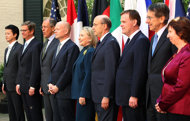G8 talks open on Syria, Iran, N.Korea crises

Setting the tone for the meeting, Clinton said she was "alarmed for the ongoing violence in Syria" and concerned about problems envoy Kofi Annan faces in trying to get Damascus to implement a Thursday ceasefire it had agreed to.
"We are very watchful of this. This will be on our agenda," Clinton told foreign ministers from Canada, Germany, Italy, Japan and Russia before the French and British top diplomats showed up later.
Hinting she would try anew to persuade Moscow to use its clout with Syrian President Bashar al-Assad to end the violence, Clinton said she would meet with her Russian counterpart Sergei Lavrov on the margins of the two-day G8 talks.
"I think there will be a very rough couple of days in trying to determine whether we go to the Security Council seeking action, knowing that Russia is still not on board," the chief US diplomat said Tuesday.
Like other G8 members, Moscow, a Syrian military ally, has backed the peace plan, but it puts far more weight on the Syrian opposition's halting 13 months of violence and has vetoed UN Security Council measures condemning Assad.
Under the peace plan presented by Annan, the UN and Arab League envoy, Syria's armed forces were to have withdrawn from protest centers on Tuesday, with a complete end to fighting set for 48 hours later.
Continuing to mount attacks, Syria announced Wednesday that it will cease military operations against rebel fighters from Thursday, but US officials again demanded deeds, not words from Assad's regime.
State Department spokeswoman Victoria Nuland also said Turkish Foreign Minister Ahmet Davutoglu was to informally speak by video conference to his G8 counterparts about the concerns he has about neighboring Syria.
Turkey has been a strong US ally in demanding Assad stop the violence.
Clinton also said the G8 ministers "all share a strong interest in stability on the Korean peninsula" and would discuss "how best to achieve that" amid fears of an imminent rocket launch by North Korea.
"North Korea is readying a long-range ballistic missile launch over the East China Sea. It comes just weeks after North Korea agreed to a moratorium on missile testing," Clinton said.
"It violates multiple UN Security Council resolutions," Clinton said at the talks, held over lunch at the Blair House across from the White House.
The Group of Eight includes the United States, Russia and Japan, which comprise half of the nations in moribund talks on ending North Korea's nuclear program.
Pyongyang announced the launch plan as it marks the 100th anniversary of the birth of the regime's founder Kim Il-Sung, despite agreeing on February 29 to freeze its nuclear and missile programs in a deal with the United States.
As part of the package, the United States was to deliver badly needed food aid to the impoverished state, a plan that Washington has since suspended.
Clinton said a meeting in Istanbul on Saturday between Iran and major powers, including several which are also in the G8, was "an opportunity for Iran to address seriously the international community's concerns."
She added: "We believe there is still time for diplomacy, but it is urgent that the Iranians come to the table to establish an environment conducive to achieving concrete results through a sustained process."
The talks between Iran and Britain, China, France, Germany, Russia and the United States -- which come after a break of more than a year -- come as Israel and Washington ramp up pressure on Iran over its contested nuclear program.
Israeli and some Western officials accuse Iran of building a nuclear bomb, but the Islamic republic says its program is for peaceful purposes.
Participants in the G8 talks also said the situation following the coup in Mali and US-led efforts to stabilize Afghanistan will also be discussed during the meetings due to end on Thursday.
Nuland said the G8 will also tackle the so-called Deauville Process which was established to provide economic and political support for "Arab Spring" transitions towards democracy.
What the stars mean:
★ Poor ★ ★ Promising ★★★ Good ★★★★ Very good ★★★★★ Exceptional
Related Contents
Latest News
More News
- Russian President congratulates Vietnamese Party leader during phone talks (January 25, 2026 | 09:58)
- Worldwide congratulations underscore confidence in Vietnam’s 14th Party Congress (January 23, 2026 | 09:02)
- Political parties, organisations, int’l friends send congratulations to 14th National Party Congress (January 22, 2026 | 09:33)
- 14th National Party Congress: Japanese media highlight Vietnam’s growth targets (January 21, 2026 | 09:46)
- 14th National Party Congress: Driving force for Vietnam to continue renewal, innovation, breakthroughs (January 21, 2026 | 09:42)
- Vietnam remains spiritual support for progressive forces: Colombian party leader (January 21, 2026 | 08:00)
- Int'l media provides large coverage of 14th National Party Congress's first working day (January 20, 2026 | 09:09)
- Vietnamese firms win top honours at ASEAN Digital Awards (January 16, 2026 | 16:45)
- ASEAN Digital Ministers' Meeting opens in Hanoi (January 15, 2026 | 15:33)
- ASEAN economies move up the global chip value chain (December 09, 2025 | 13:32)

 Tag:
Tag:




















 Mobile Version
Mobile Version